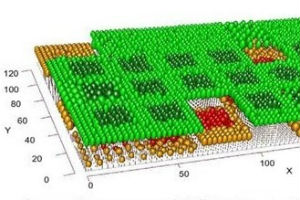 Modelling to provide management tools for adapting permanent forest and agroforestry systems to global climate change (MACCAC)
Modelling to provide management tools for adapting permanent forest and agroforestry systems to global climate change (MACCAC)
Climate change will have such widespread economic impact that the World Bank has recently issued warnings (2012). The “turning point”, the point when the increase in mean temperature exceeds the inter-annual variations, is likely to occur in five to ten years time in the tropics and a few decades later at higher latitudes (Mahlstein et al, 2011; Hawkins and Sutton, 2012; UIPCC, 2013). The tropics are vulnerable but are able to draw on long experience in the management of agroecosystems with low inputs that are subject to stress. They thus provide the world with a laboratory for testing adaptation scenarios.
Each agroecosystem is defined by a temperature range and resources beyond which it is no longer viable and should be replaced (crops) or modified through management changes (permanent plantations). Certain practices can increase the resilience: introduction of structural variety (multiple layers) and diversity (multi-species, several sources of revenue) in permanent plantations can improve the microclimate, effects of facilitation to capture resources (light, water, nutrients), the supply of ecosystem services.
Hypothesis
Some multiple layer systems as used in agroforestry are intrinsically more resilient and might inspire other adaptation approaches in the short term.
Implementation
MACACC will bring together economists, stakeholders (professional organisations plus a large panel of producers, > 300), climatologists, ecophysiologists and modelling experts to consider how to adapt their permanent plantations to climate change.
Three permanent plantations have been selected as case studies based on their economic importance (for ligneous wood products or for coffee), their origin (2 in the tropics, Eucalyptus and coffee agroforestry, and one in France, Pinus pinaster Douglas Fir) and their structure (single or multiple layer, main crop in first or second layer)..
Together with the stakeholders, we will define “adaptive management scenarios which could realistically be implemented in the near future. These scenarios should meet the following criteria :
- The ability and willingness of stakeholders to comply with these adaptive management scenarios will be tested by the economists involved in the project through experiments set up in particular to estimate the preferences of stakeholders for various incentive mechanisms (payment for ecosystem services, certification, etc.);
- The climatologists will adjust the climate scenarios to local conditions for forthcoming decades (IPCC 2013) and for the longer term (IPCC, 2007), and these scenarios will drive the biophysical model, functioning at forest plot or agroforestry scale for full cycles. The model will be parameterised and verified using data that is already available from real field experiments, in a large range of availability of light (climate and shade tree density), water (exclusion of precipitation experiments), nutrients and CO2 (Free-Air CO2 Enrichment data (FACE program)). This will give ecological resilience profiles for each scenario, including an assessment of the supply of ecosystem services (including yield), for current and future climatic conditions;
- These profiles will be combined with the ability and willingness of stakeholders to adopt the management scenarios to generate global resilience profiles, incorporating the ecological, economic and decision-making aspects;
The outcomes will be discussed with the stakeholders and the scenarios will be classified on the basis of multi-criteria choices. The scientific results will be evaluated by the stakeholders and the deliverables will be used for raising awareness, training planters and students or as decision-making tools for planters and decision-makers.
The thesis of Rémi Vezy is carried out within the framework of this project
Date
2014-2017
Partners
Industrialists : CRPF-Aquitaine, PROMECAFE (Amérique Centrale), IPEF (Brésil)
Academic : CIRAD, INRA, U. Sydney (Australie), CATIE (Costa Rica)
Funding
ANR AgroBiosphère
Contact
Olivier Roupsard, Eco&Sols, CIRAD Costa Rica
e-mail :






